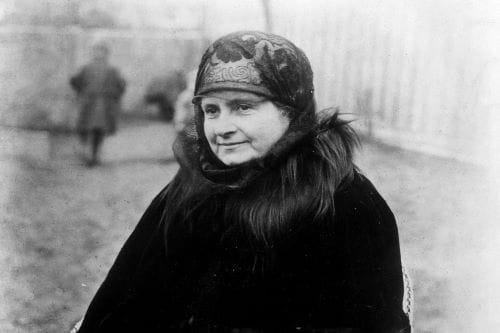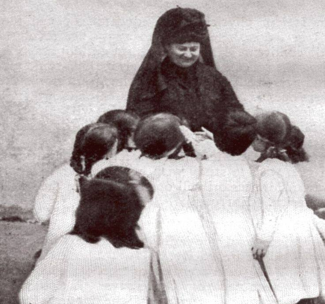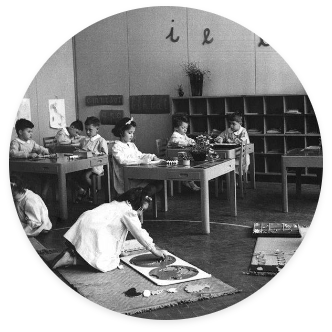
About Dr. Maria Montessori
Dr. Maria Montessori, an Italian physician and educator, is celebrated for her innovative educational method that mirrors how children naturally learn.

On January 6, 1907, she opened the Casa dei Bambini (Children’s House) in Rome, which quickly gained attention. Her extensive writing and travel led to the global spread of Montessori schools.
Born on August 31, 1870, in Chiaravalle, Italy, Dr. Montessori was influenced by her well-educated mother and the rich educational environment of Rome. Her early immersion in libraries, museums, and schools shaped her vision and passion for learning, guiding her to develop her renowned educational approach.

Breaking Barriers in Education
Maria Montessori, an exceptional student, defied traditional gender roles from an early age. At 13, she entered an all-boys technical institute to study engineering but later shifted to medicine.
Despite an initial rejection by the University of Rome’s medical program, Maria’s perseverance led to her admission after taking additional courses. She graduated in 1896 as one of Italy’s first female physicians, marking a significant achievement in a male-dominated field and showcasing her strength, dedication, and resilience.
Birth of a Movement
Maria Montessori initially practiced psychiatry but soon shifted her focus to education, studying pedagogy and questioning existing methods for teaching children with intellectual and developmental disabilities.
In 1900, she became co-director of a new institute for special education teachers, applying scientific observation and experimentation. Her innovative methods led to notable improvements in many children, marking the program a success.
In 1907, Maria opened a full-day childcare center in San Lorenzo, Rome, for underserved children aged 3 to 7. This center, later known as the Casa dei Bambini, was Italy’s first of its kind. Despite initial challenges, the children thrived with Maria’s specially designed learning materials, demonstrating increased concentration and self-discipline.
The success of her methods led to widespread recognition, with Montessori schools opening across Western Europe and the United States, including the first American Montessori school in Tarrytown, NY, in 1911.
A Legacy of Education, Advocacy, and Resilience
Following her initial successes, Maria Montessori dedicated her life to advancing her child-centered educational approach. She lectured extensively, wrote numerous articles and books, and developed a teacher training program for the Montessori Method. Her work, along with that of her followers, led to the global adoption of Montessori education.
As a prominent advocate for women’s rights, Maria used her platform to push for greater opportunities for women, gaining recognition as a leading feminist figure.
During turbulent times, she added peace education to the Montessori curriculum. In 1940, while in India, the outbreak of hostilities between Italy and Great Britain forced her into exile for the rest of World War II, during which she continued training teachers.
After the war, Maria returned to Europe and spent her final years in Amsterdam. She passed away peacefully in a friend’s garden on May 6, 1952.
Dr. Maria Montessori Quotes
The Child and Learning
“When a child is given a little leeway, he will at once shout, ’I want to do it!’ But in our schools, which have an environment adapted to children’s needs, they say, ‘Help me to do it alone.’”
—The Secret of Childhood
“The child who concentrates is immensely happy.”
—The Absorbent Mind
“At some given moment it happens that the child becomes deeply interested in a piece of work; we see it in the expression on his face, his intense concentration, the devotion to the exercise.”
—The Discovery of the Child
“The hand is the instrument of intelligence. The child needs to manipulate objects and to gain experience by touching and handling. ”
—The 1946 London Lectures
“Education must begin at birth.”
—The 1946 London Lectures
“The satisfaction which they find in their work has given them a grace and ease like that which comes from music.”
—The Discovery of the Child
“A child who has become master of his acts through long and repeated exercises, and who has been encouraged by the pleasant and interesting activities in which he has been engaged, is a child filled with health and joy and remarkable for his calmness and discipline.”
—The Discovery of the Child
“Praise, help, or even a look, may be enough to interrupt him, or destroy the activity…. The great principle which brings success to the teacher is this: as soon as concentration has begun, act as if the child does not exist.”
—The Absorbent Mind
“As we observe children, we see the vitality of their spirit, the maximum effort put forth in all they do, the intuition, attention and focus they bring to all life’s events, and the sheer joy they experience in living.”
—The Child, Society and the World (Unpublished Speeches and Writing)
“The child who has never learned to work by himself, to set goals for his own acts, or to be the master of his own force of will is recognizable in the adult who lets others guide his will and feels a constant need for approval of others.”
—Education and Peace
“… in every child is the seed that will mature into an adult.”
—The Theosophist
“In the child is much knowledge, much wisdom. If we do not profit from it, it is only because of neglect on our part to become humble and to see the wonder of this soul and learn what the child can teach.”
—The Theosophist
“The child looks for his independence first, not because he does not desire to be dependent on the adult. But because he has in himself some fire, some urge, to do certain things and not other things.”
—The Theosophist
“It is necessary that the child teach himself, and then the success is great.”
—The Theosophist
“Children acquire knowledge through experience in the environment.”
—The 1946 London Lectures
“Children are endowed with a power that enables them to reconstruct things which are very complex, and they do so with a great deal of pleasure.”
—The 1946 London Lectures
“Adults move because their will directs them. The small child is urged by nature.”
—The 1946 London Lectures
“… the child’s individual liberty must be so guided that through his activity he may arrive at independence … the child who does not do, does not know how to do.”
—The Montessori Method
The Role of the Teacher
“The teacher has two tasks: to lead the children to concentration and to help them in their development afterwards.”
—The Child, Society and the World (Unpublished Speeches and Writing)
“The teacher’s task is not to talk, but to prepare and arrange a series of motives for cultural activity in a special environment made for the child.”
—The Absorbent Mind
“The instructions of the teacher consist then merely in a hint, a touch—enough to give a start to the child. The rest develops of itself.”
—Dr. Montessori’s Own Handbook
“Here is an essential principal of education: to teach details is to bring confusion; to establish the relationship between things is to bring knowledge.”
—From Childhood to Adolescence
“The teacher, when she begins work in our schools, must have a kind of faith that the child will reveal himself through work.”
—The Absorbent Mind
“An ordinary teacher cannot be transformed into a Montessori teacher, but must be created anew, having rid herself of pedagogical prejudices.”
—Education for a New World
“She [the Montessori teacher] must acquire a moral alertness which has not hitherto been demanded by any other system, and this is revealed in her tranquility, patience, charity, and humility. Not words, but virtues, are her main qualifications.”
—The Discovery of the Child
“The fundamental help in development, especially with little children of 3 years of age, is not to interfere. Interference stops activity and stops concentration.”
—The Child, Society and the World (Unpublished Speeches and Writing)
Education & Social Change
“The child is both a hope and a promise for mankind.”
—Education and Peace
“We shall walk together on this path of life, for all things are part of the universe and are connected with each other to form one whole unity.”
—To Educate the Human Potential
“Education is the best weapon for peace.”
—Education and Peace
“True peace … suggests the triumph of justice and love among men; it reveals the existence of a better world where harmony reigns.”
—Peace and Education
“An education capable of saving humanity is no small undertaking: it involves the spiritual development of man, the enhancement of his value as an individual, and the preparation of young people to understand the times in which they live.”
—Education and Peace
“If we are among the men of good will who yearn for peace, we must lay the foundation for peace ourselves, by working for the social world of the child.”
—International Montessori Congress, 1937
“The only true freedom for an individual is to have the opportunity to act independently … there is no such thing as an individual until a person can act by himself.”
—Education and Peace
“Preventing conflicts is the work of politics; establishing peace is the work of education.”
—Education and Peace
“This is the hope we have—a hope in a new humanity that will come from this new education, an education that is collaboration of man and the universe….”
—The Theosophist